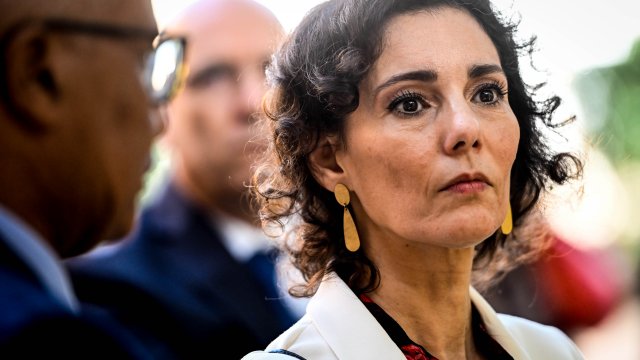The Belgian diplomat expressed her opposition to boycotting the major tournament in the Gulf state.
Belgium’s foreign minister Hadja Lahbib is set to support the Red Devils in Qatar at the 2022 FIFA World Cup despite criticism in Brussels, Belgian newspaper L’Echo reported on Wednesday, confirming she will not boycott the tournament.
“Belgium remains firm and demanding in respect for human rights and working conditions in Qatar, but if we want things to change, we must support Qatar’s efforts to improve these conditions” said Lahbib, as quoted by the newspaper.
Lahbib is set to represent her country’s delegation at Belgium’s first match, scheduled to kick off on 23 November against Canada. Belgium had secured its spot for the World Cup last year after a 3-1 win over Estonia.
The Belgian official’s visit also comes amid an apparent divide in the European country regarding Qatar’s hosting of the major sporting event, citing violations of migrant workers’ rights and the LGBTQ+ community.
Lahbib said halting dialogue does not yield progress and visiting Qatar would enable Belgium to discuss the continuation reforms implemented in recent years to address workers’ rights.
“I am therefore opposed to a boycott of the World Cup which would be totally ineffective and purely ideological, especially since it would isolate us on the international stage. Most European countries have already indicated that they will send a ministerial delegation to Doha,” she said.
The Belgian diplomat noted that Qatar has long been a key “commercial partner of Belgium” with it being one of its main gas suppliers.
Lahbib also highlighted Qatar’s crucial efforts last year in evacuating Belgians from Afghanistan last year following the Taliban takeover of Kabul.
At the time, Doha carried out history’s largest airlift of people and managed to safely evacuate at least 80,000 Afghans and foreigners.
“This is why I will go to one of the Red Devils matches in the first round of the World Cup. I will go there with clear messages on human rights, especially with regard to the rights of women and LGBTQIA+, and working conditions,” added Lahbib.
Meanwhile, several bars and municipalities in Brussels have opted to boycott the major sporting event, citing concerns over the migrant workers’ situation in Qatar as well as the rights of the LGBTQ community.
Belgium bar owner Emmanuel Simonis told Euronews last month that he made the decision based on “political, ethical, social and ecological reasons.”
Anti-Qatar campaign
Last year, various European countries doubled down on scrutiny with the launch of a campaign to boycott the World Cup. These include Denmark, the Netherlands, and France. Despite this, ticket sales have spiked in Europe.
Since Qatar won the bid in 2010 to host the major tournament for the first time in the Middle East, headlines – mainly from western media – as well as reports from rights groups have sounded the alarm on Qatar’s track record on human rights violations.
The Gulf state says it has responded to the concerns by introducing mass reforms to its legislation, all of which have received global praise by rights groups including the UN’s International Labour Organization, which has set up an office to oversee such changes in Qatar.
This week, the Chief Executive Officer of Qatar 2022 Nasser Al-Khater said the campaign against Doha and its hosting of the World Cup is linked to Europe’s refusal to see a country outside its region take on the tournament.
“European countries feel they have monopoly over the World Cup. Europe has hosted 11 tournaments out of 22 tournaments, of course it refuses that a country like Qatar or an Arab Muslim country hosts a tournament like the World Cup,” Al-Khater told Al Jazeera Arabic in a televised interview on Monday.
Addressing the scrutiny, Al-Khater said the anti-Qatar campaign has evolved over the past decade, with aims taken at Qatar size as a geographically small country to its hot summer climate.
“From the start, we have said that this tournament represents all Arabs and is for the entire Arab world, this increases our excitement and our sense of responsibility and increases determination to make this tournament a success,” said Al-Khater.
Qatari officials have taken a more head on approach to call out criticism, highlighting apparent angles taken by western media that have widely disregarded progress made on the ground.
Speaking to Sky News on Sunday, Qatar’s Foreign Minister Sheikh Mohammed bin Abdulrahman Al Thani said critics of the World Cup in Qatar are “arrogant” and “cannot accept a small country from the Middle East”.
Echoing the same sentiment, Al-Khater said accusations targeting Qatar have appeared to be backed by racist and political motives.
This week, French outlet Le Canard Enchaîné has come under fire for publishing a caricature depicting Arabs in ‘Qatar’ football kits as terrorists. The image employs the exhausted use of ‘savages’ – ‘long bearded’ angry men with dark hair, angry expressions in possession of guns and knives.
French ambassador to Doha Jean-Baptiste Faivre told Al Kass TV that criticism of Qatar’s treatment of migrant workers by some French entities “do not reflect the position of the government.”
“France will not boycott the World Cup,” he added.







